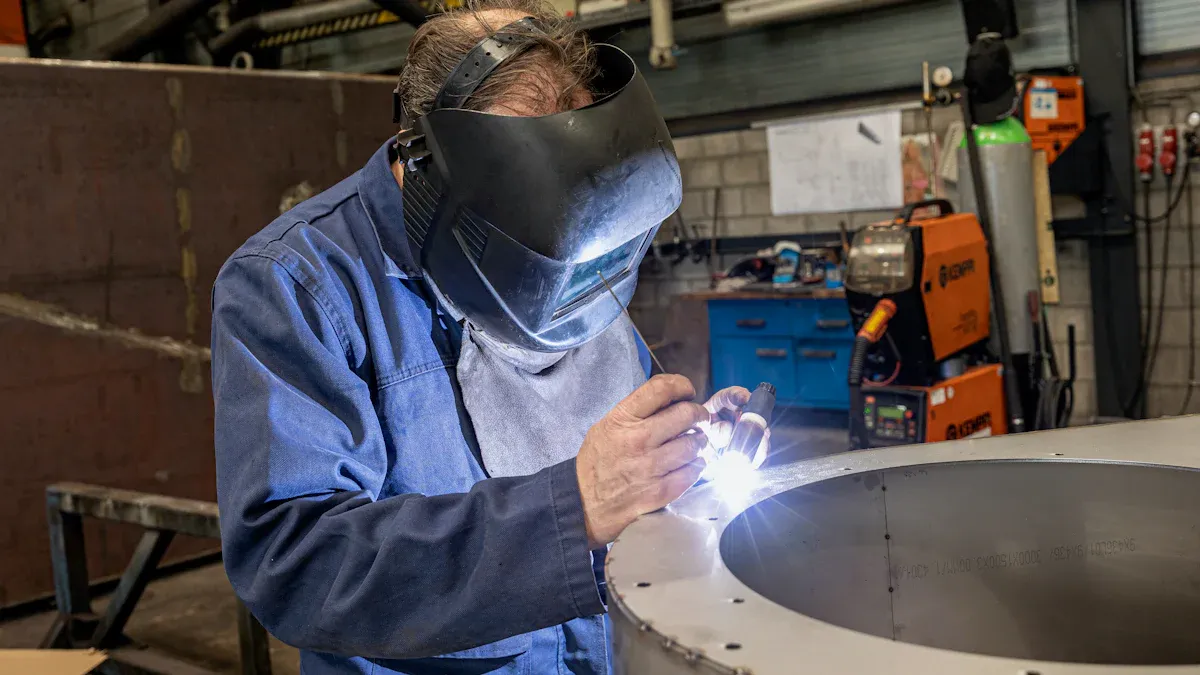How to Choose the Right High-quality Nitinol Tubing Supplier for Your Project
When searching for high-quality Nitinol tubing suppliers, it’s important to verify their expertise in medical applications and ensure they hold genuine certifications. You want a supplier who understands strict medical regulations and can produce specialized products. Many medical device projects rely on tubing, so it’s crucial that the supplier offers support and traceability for their products. High-quality Nitinol tubing suppliers who respond promptly help you avoid costly mistakes. Take the time to follow clear steps when selecting a Nitinol tubing supplier.
Key Takeaways
You should know what your project needs before picking a nitinol tubing supplier. This helps you find the best one. Always look for important certifications like ISO 13485 and FDA. These show the supplier cares about quality and safety. Pick suppliers who can make custom products and give strong technical help. This will help meet your special needs. Choose suppliers who deliver on time and have good customer service. This helps you avoid delays and problems. Compare suppliers by looking at quality, support, and price. This helps you get the best deal and avoid expensive mistakes.
Define Your Needs
Project Requirements
Before picking a nitinol tubing supplier, you need to know what your project needs. Each project is different. Knowing your needs helps you find the best supplier. First, write down what you need from nitinol tubing. Think about these things:
Check if the supplier has the right certificates. Look for things like ISO 9001 and AS9100. These show the supplier follows important rules.
Try out sample nitinol materials. Make sure they work for your project.
See if the supplier can make special sizes or finishes. Your project might need something unique.
Check if the supplier can make enough tubing for you. Make sure they can deliver on time.
Look at prices. Think about what you get for your money, not just the cheapest price.
Ask where the supplier gets their raw materials. Good sources help stop supply problems.
Make sure the supplier can design and make nitinol parts themselves. This helps keep quality high.
Build a good relationship with your supplier. Talking often helps your project go well.
You should also think about how easy it is to make your design. Suppliers with engineering teams can help you make your nitinol tubing better. Sometimes, you need special steps like electropolishing or passivation for your project.
Application Details
Your project will decide what kind of nitinol tubing you need. Medical and industrial projects need different things. You should pick a supplier that is good at your type of project. The table below shows the main differences:
Aspect | Medical Application Requirements | Industrial Application Implications |
|---|---|---|
Chemical Composition | Biocompatibility, corrosion resistance | Less strict |
Transformation Temperatures | Critical for shape memory and superelasticity | May be less critical |
Microstructural Attributes | High fatigue life, wear resistance | Standards may be relaxed |
Tight tolerances, especially for devices like stents | Broader tolerances | |
Quality Standards | ISO 13485, FDA 21 CFR Part 820 required | Fewer or different certifications |
Customization | Tailored diameters, wall thicknesses, surface finishes | Customization less critical |
Supply Chain Reliability | Essential for timely delivery | Important, but priorities may differ |
Customer Support | Strong technical assistance, rapid issue resolution | Support may be less specialized |
Tip: For medical projects, always pick a nitinol supplier who has shown they can meet tough rules for quality and safety. For industrial projects, you might have more choices, but you still need good nitinol tubing.
No matter what your project is, your supplier must give you good quality, fast delivery, and helpful support. Medical projects need strong supply chains and great customer service. Industrial projects may care more about price and being flexible.
Supplier Quality

Certifications & Standards
When picking a supplier for medical device tubing, you need to check their certifications. These show the supplier follows important rules for safety and quality. For medical grade nitinol tubing, some certifications matter most:
ISO 13485 means the supplier meets worldwide rules for making medical devices.
FDA compliance, like 510(k) clearance, shows the supplier follows the law for medical devices.
Biocompatibility testing proves the tubing is safe inside the body and lowers risks.
These certifications help make sure the tubing is safe and works well. Suppliers with these certificates care about quality and safety. They also give you paperwork and records for every batch of nitinol tubing.
Note: Always ask your supplier for certificates and records. These papers help you know where the tubing came from. This is very important for medical use.
If a supplier follows ISO 13485 and ASTM F2063, they use special ways to check the tubing. They use tools like laser micrometry and ultrasonic testing to check size and strength. Regular checks and certifications help stop problems and make sure the tubing is good for medical use.
You should also know that rules are different in each place. The table below shows how the US, EU, and Asia are different:
Region | Key Regulatory Requirements | Impact on Safety and Performance |
|---|---|---|
US | FDA approval (ISO 13485, FDA 21 CFR Part 820), long approval times, higher compliance costs | High reliability, longer lead times |
EU | MDR requires stricter testing, impacts smaller companies | Enhanced safety, higher costs |
Asia | Emerging market, less defined regulations | Variable quality, less predictability |
Picking a supplier who knows global rules helps you avoid waiting and makes sure your tubing meets all standards.
Medical Grade Nitinol Tubing
Medical grade nitinol tubing is different from industrial tubing because it is made and tested very carefully. You need this kind of tubing for things that go inside the body. Medical grade nitinol tubing can return to its shape after bending. It can also handle being bent many times without breaking. These things are important for medical devices like stents and guidewires.
Makers use special finishing, like electropolishing, to make the tubing smooth. This helps stop rust and lowers nickel release, which makes it safer and stronger. Careful control of the nickel-titanium mix and keeping out bad stuff makes sure the tubing is safe for medical use.
Quality checks for medical grade nitinol tubing include:
Very exact sizes for a perfect fit in devices.
Tests that do not break the tubing to find hidden problems.
Following ASTM F2063 and ISO 13485 rules.
Keeping records from start to finish.
You should get certificates and reports about safety, strength, and size from your tubing maker. These checks make sure the tubing is safe for people.
Tip: Never pick low-quality tubing for medical use. Good tubing keeps your device working and patients safe.
Good suppliers use special tools and lots of tests to make sure the tubing is right. They let you choose special options and help you with questions. Picking a supplier with experience and certificates lowers risks and helps you get your product approved faster.
Customization & Expertise

Technical Capabilities
You need a supplier who knows what you want. They should give you nitinol tubing that fits your project. Good nitinol tubing suppliers have strong technical skills. They control each step, from melting metal to making the tube. This way, the nitinol stays the same quality and has fewer problems. Suppliers with good factories can meet ASTM F2063 rules for many uses. They use strong melting and finishing steps. This makes sure your nitinol tubing is superelastic, has shape memory, and is strong.
A supplier with their own engineers can help you early. They talk with you to learn what you need. They suggest the best nitinol for your project. You get help with design, testing, and making samples. This teamwork helps you avoid errors and finish faster. You can trust your nitinol tubing will work well in tough jobs, like surgery or airplanes.
Note: Special ways of making tubing, like electropolishing and cryogenic machining, make the surface better and stronger. These steps are very important for medical devices and other hard jobs.
Custom Solutions
Each project is different. You might need special nitinol tubing. Top suppliers let you pick many custom options. They can change the size, wall thickness, and surface to fit your needs. Many medical device makers want tight sizes, laser cutting, coiling, and special shapes. These custom choices help you make nitinol tubing that works just right.
If you work with a supplier who controls all steps, you get more say in your project. They can change things fast and tell you what is happening. This makes things quicker and helps you meet deadlines. Suppliers who work with OEMs can make samples fast and produce more when needed. You get good nitinol tubing and help from start to finish.
Benefits of picking a supplier with good custom skills:
Same quality and fewer problems
Faster making and delivery
Help with hard and new designs
Good supply and steady prices
Tip: Always pick a supplier who listens and gives custom choices. This helps your nitinol tubing work well and do what you want.
Delivery & Support
Reliable Delivery
You need a nitinol tubing supplier who delivers on time. In medical device work, late orders can cause big problems. You might miss deadlines and pay more money. Most custom nitinol tubing takes 4 to 12 weeks to arrive. Some suppliers can deliver in 4-6 weeks if they work faster. Small orders may come in about 31 days. Big orders can take longer to finish. Quality checks and fixing mistakes can add up to 30 more days. You should plan for these times to keep your project going.
Getting your order on time is not just about speed. You should pick suppliers with strong supply chains. Good suppliers watch their vendors and use numbers to check performance. They talk openly and use digital tools to track orders. They fix problems fast when something goes wrong. These steps help you avoid delays and keep your project moving.
Tip: Pick suppliers known for delivering on time. This helps you trust them and avoid problems that cost money.
A good supplier will have backup plans if something goes wrong. They will tell you what is happening with your order. They share updates about when you will get your tubing. This honesty helps you plan and trust their work.
Customer Service
Customer support is very important when picking a supplier. You want a supplier who answers fast and gives good advice. Good support helps you pick the right tubing and fix problems quickly. The best suppliers give help all day or have someone just for you.
Look for these customer service signs:
Fast and smart answers to your questions
Honest updates about making and shipping
Ready to give samples and special options
On-time delivery and checks for quality
Suppliers who care about trust keep you updated at every step. They show you clear prices and help even after you get your order. This kind of service shows they care about quality and want to work with you for a long time.
Note: Good customer support and on-time delivery make the best suppliers stand out. They help you finish on time and keep your project quality high.
Selection Process
Compare High-quality Nitinol Tubing Suppliers
You should compare nitinol tubing suppliers in a simple way. First, write down what your project needs. Look at how each supplier checks quality, helps customers, and sets prices. Do not just pick the cheapest one. Suppliers with good quality and support can help you avoid problems later.
Check if the supplier is trusted and has experience. Read what others say and ask for proof.
Make sure they have certifications like ISO 13485 and FDA or CE.
Ask if they use new ways to make nitinol tubing.
Get samples from them. Test the samples for size, strength, and smoothness.
See how fast they answer your questions and fix problems.
Check if they can make tubing just for your project.
Think about how fast they deliver and if they are reliable.
Tip: Top suppliers like GEE SMA are known for new ideas and great quality. Use them as an example when you look at other suppliers.
When you compare suppliers, you learn who you can trust. You see how they handle your requests and check their records. This helps you avoid bad materials and costly mistakes in your project.
Evaluate Costs & Value
You need to look at both cost and value when picking a supplier. Price is not the only thing that matters. Good nitinol tubing may cost more, but it is often better and lasts longer. This can save you money and time over your project.
Here is a table that shows how prices can change:
Supplier/Quality Level | Price Range (USD/kg) | Certification Impact | Lead Time (days) | Order Volume Impact | Notes on Cost Drivers |
|---|---|---|---|---|---|
Industrial-grade tubing | $0.7–10 | Low | 30-45 | Larger orders reduce price | Lower quality, less strict controls, simpler manufacturing |
Medical-grade tubing | $70–100 | High (ISO 13485, FDA 21 CFR) | 30-45 | Economies of scale apply | Certified suppliers have higher compliance costs, advanced sterilization, and quality control |
Custom-engineered alloys | $800–2,000 | Very High | 90-120 | Smaller MOQs, higher per-unit cost | Complex customization, advanced testing, longer lead times |
You should also think about these things:
Price transparency: Make sure the price is clear with no hidden costs.
Customization: Suppliers who meet your needs may cost more but give more value.
Supply chain: Good delivery and strong shipping help you avoid delays.
Post-sale support: Good suppliers help you after you buy and offer warranties.
Note: US and European suppliers may cost more for fast delivery and certifications. Asian suppliers might be cheaper but take longer to ship. Always balance price with quality and trust.
Avoid Common Mistakes
Many people make mistakes when picking a nitinol tubing supplier. You can avoid these mistakes by following some easy rules:
Do not pick a supplier just because they are cheap. Low prices can mean low quality or bad support.
Always check for certifications. If they do not have ISO 13485 or ASTM F2063, your project could be at risk.
Test samples before you order a lot. This helps you trust their quality.
Watch out for extra costs like shipping or custom work.
Make sure the supplier can make more tubing if you need it.
Stay away from suppliers who are late or have bad quality. Delays can hurt your project.
Make sure you talk clearly. Get all deals in writing for price, delivery, and custom work.
Callout: Testing samples and talking often with your supplier helps you find problems early. This saves time and money and builds trust.
Final Checklist
Use this checklist to help you pick the best nitinol tubing supplier:
Evaluation Aspect | Description and Importance |
|---|---|
Certifications | Check for ISO 13485, ASTM F2063, FDA, and CE for safety. |
Size & Tolerances | Make sure the tubing size fits your project. |
Fatigue Resistance | Check if the tubing is strong and lasts long. |
Surface Condition | Look at the finish to stop rust and keep it smooth. |
Quality Documentation | Ask for records and test results to build trust. |
Sample Testing | Test samples for fit, strength, and how they work. |
Cost Transparency | Look at all costs, even shipping and hidden fees. |
Delivery Reliability | Check if they deliver on time and have a strong supply chain. |
Customer Support | See if they answer fast and help with problems. |
Innovation & Stability | Think about if they can help with new projects in the future. |
Tip: Try to build a long-term relationship with your supplier. This helps you get good quality, fair prices, and support for new projects.
If you follow these steps, you will find the best nitinol tubing supplier for your project. You will get good tubing, on-time delivery, and strong support for your project’s success.
Picking the right nitinol tubing supplier means you want someone with experience, who can make special products, and who helps you when needed.
The best suppliers work hard to keep their supply chain strong, make things very exact, and try new ideas.
You should look for clear paperwork, good customer help, and if they can follow tough rules.
Use simple steps: know what you need, try out samples, and work with the supplier for a long time.
Doing this helps you get great tubing, reach your project goals, and make your devices work better.
FAQ
What certifications should you look for in a nitinol tubing supplier?
Look for ISO 13485, ASTM F2063, and FDA or CE certificates.
Tip: These certificates mean the supplier follows tough safety and quality rules.
How can you test the quality of nitinol tubing before placing a large order?
Ask the supplier for samples. Check if the samples are the right size, strong, and smooth.
Always look at the supplier’s test papers and records.
Why does medical-grade nitinol tubing cost more than industrial-grade?
Medical-grade tubing is made with stricter checks, better tests, and special steps.
Note: This extra work makes sure medical devices are safe and work well.
What should you do if your project needs custom nitinol tubing?
Tell the supplier exactly what you need. Ask about special sizes, finishes, or shapes.
Pick suppliers who help with design and make samples quickly.
See Also
Choosing The Ideal Nitinol Tubing Supplier For You
A Detailed Guide To Selecting Proper Nitinol Tubing
Finding The Most Cost-Effective 2mm Nitinol Tubing Supplier

